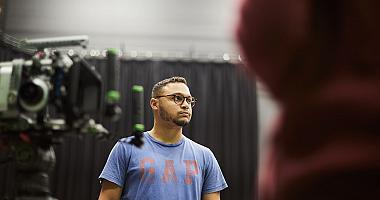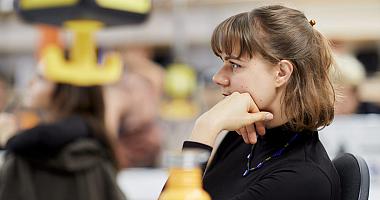Course information
Department
Length
1 year full-time
Course overview
If you want to be a filmmaker this is the place to learn, gain experience and make films you will be proud to have on your show reel.
As a student on one of the six pathways you'll develop your specialist skill. In addition, you'll also have a range of short optional modules in other production areas of your choosing to give you the kind of flexibility that the industry now expects. The options include script and project development, web drama, online content, and social activist filmmaking, alongside more traditional media such as camera and editing skills.
Our filmmaking facilities and scheduling are geared around fiction production, as this is a major opportunity that the learning on the programme provides. The ethos of the course is “form follows function.” Your study and practice throughout the year will equip you with the most appropriate means of telling your story in order to connect with an audience.
Filmmaking is a team activity. Every student is required to work closely with others as part of a creative team to produce their final project. All the programmes also have good contacts and connections with students in the other specialist areas your productions might require, such as music composition, hair and makeup, set design, scriptwriting and of course acting talent.
Filmmaking is very demanding; it requires a lot of commitment, imagination and teamwork. You will be fully stretched on these programmes.
Pathways
This MA has six pathways you can follow:
- MA Filmmaking (Cinematography)
- MA Filmmaking (Directing Fiction)
- MA Filmmaking (Editing)
- MA Filmmaking (Producing)
- MA Filmmaking (Sound Recording, Post-Production and Design)
- MA Filmmaking (Screen Documentary)
The programmes also retain close links with MA Scriptwriting.
The filmmaking programmes are located within a large and very lively Media and Communications Department that is also home to a range of practice MA programmes in radio, journalism and scriptwriting for example.
There is also a range of theory MAs and strong research tradition, with the Department coming top in the entire country on research intensity. This makes for a very stimulating and creative environment.
The questions we ask
Where is cinema going? Where is TV heading? How and where are people going to watch moving images? What do new audiences want these to look and sound like? What new platforms are on the horizon? How are the traditional craft skills relevant to the digital age?
These are the kinds of questions we’re interested in. And we don’t explore them alone. Our annual Olive Till Memorial debate features world-renowned industry speakers including directors Danny Boyle, Gurinder Chadha and Paul Greengrass, and producers Tessa Ross and Tim Bevan, so you get the best kind of insight while you’re here.
The processes we use
We offer advanced skills training to film school standards. You will work within a building with studio and rehearsal spaces, screening rooms and up-to-date camera, lighting and sound equipment, plus sound and edit suites.
The approach we take
We encourage you to meet filmmakers, work with others, and exchange ideas. The programme includes regular masterclasses where students from all the programmes and others come together to learn about current industry trends, new opportunities and ideas with leading figures of the UK film and television industries. But filmmaking is not only about these industries, it also offers a wealth of transferable skills for students interested in all media platforms, including web drama, video games, art gallery installations of all types, interactive mixed media and live performance and music videos.
Our reputation
The Department of Media, Communications and Cultural Studies has been ranked 2nd in the UK for 'world-leading or internationally excellent' research (Research Excellence Framework, 2021) and 16th in the world (3rd in the UK) in the 2024 QS World Rankings for communication and media studies.
Contact the department
If you have specific questions about the degree, contact the department.






